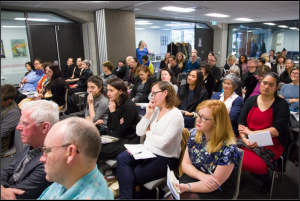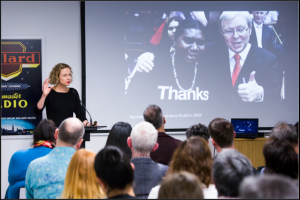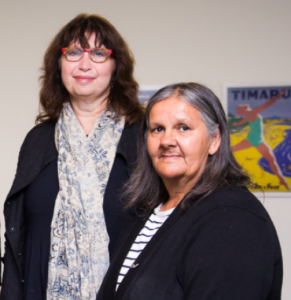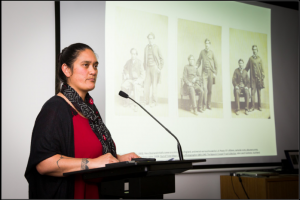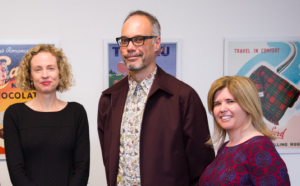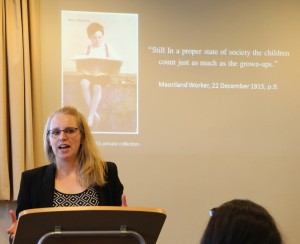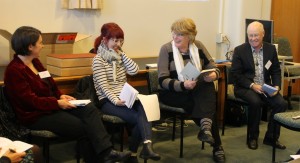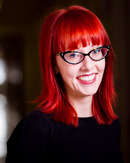CFP: Film in the Colony
On 13 and 14 July 2017, the Centre for Research on Colonial Culture and Ngā Taonga Sound and Vision are hosting the Film in the Colony Symposium in Wellington.
Keynote Speakers: Dame Professor Anne Salmond (University of Auckland), Dr Ian-Malcolm Rijsdijk (University of Cape Town)
Organisers invite papers that investigate the cross-cultural processes of film production in the colonial context, and the ways in which indigenous and settler participants – performers, crew, or people from the localities where filming took place – took part in productions. In focusing primarily on New Zealand, South Africa and Australia, the symposium also seeks to develop a comparative analysis of the means through which film contributed to the making of national stories in the late colonial era, and how indigenous communities within these colonies engaged with the first few decades of film culture.
Contributions from a variety of disciplines and backgrounds are welcome, such as film studies, history, Māori and/or indigenous studies, anthropology, archives, screen industries, and communities.
Send a 200-word abstract and a brief bio to filminthecolony@otago.ac.nz by 28 February 2017.
Convenors: Annabel Cooper (Centre for Research on Colonial Culture, University of Otago), Diane Pivac, Honiana Love (Ngā Taonga Sound and Vision), Minette Hillyer, Jo Smith (Media Studies, Victoria University of Wellington).
Family Ties, Literary Kinship and Creative Production in 19th Century Britain
On 12-14 February 2017, the Department of English and Linguistics, University of Otago, will host ‘Family Ties,’ an international symposium exploring literary kinship and creative production in nineteenth-century Britain. The CFP is below.
Plenary Speakers:
Judith Pascoe, University of Iowa
Devoney Looser, Arizona State University
In 1800, poet and playwright Joanna Baillie dedicated her Series of Plays to her physician brother Matthew Baillie for his “unwearied zeal and brotherly partiality”; Matthew himself had recently edited the anatomical research of their uncles, John and William Hunter. At century’s end, Oscar Wilde cited his mother Jane Wilde’s translation of Sidonia the Sorceress (1849) and his great-uncle Charles Maturin’s Melmoth the Wanderer (1820) as his “favourite romantic reading when a boy.” Family played an important role in the literary and artistic productions of the long nineteenth century, from the Burneys to the Brontës, and the Rossettis to the Doyles. Critical approaches ranging from Noel Annan’s “Intellectual Aristocracy” to Bruno Latour’s Actor-Network-Theory have provided useful ways of assessing and contextualising the role of family in the creative production of writers and artists, but still the role of the family remains under explored.
We invite submissions for “Family Ties” focused on British literary and artistic families in the nineteenth century. Topics for 20-minute papers might include:
Interdisciplinary Influences
Collaborations and/or Dissents
Authorial Identity/ies
Communities and Networks
Redefining Family Units
Stages of Life (births, marriages, deaths)
Reimaginings of nineteenth-century families
Families, Creativity, and Empire
Economics of Family Authorship
Literary and Artistic Legacies
Little-known Relations
Generational Influences
Please send abstracts of 250-300 words by 15 November to Dr Thomas McLean and Dr Ruth Knezevich at familyties@otago.ac.nz.
Details of the conference will be posted online here as they become available.
Book & Place Symposium
On 27 and 28 October, the University of Otago Centre for the Book is hosting its annual Research Symposium on the theme of Book and Place.
It will open on the evening of 27 October with a public lecture from Neville Peat in the Dunningham Suite, 4th floor, Dunedin Public Library, starting about 7.00 pm. You are cordially invited to come and listen to this well-known author reflect on his sense of book and place as he describes, in words and pictures, some of New Zealand’s most remote and precious areas and landmarks. An informal reception will follow the talk.
The Symposium proper will begin at the Marjorie Barclay Theatre, Otago Museum at 9.00 am on Friday 28. Professor Tony Ballantyne will begin proceedings, and after morning tea, Dr. Ingrid Horrocks of Massey University will deliver a plenary paper entitled: ‘Writing Place: A Case for Creative Nonfiction’. Nicky Page, Director of Dunedin’s UNESCO City of Literature programme will also be present. Please check out the full programme through the Centre for the Book blog
Importantly, for those attending the Thursday night ecture, please notify the Dunedin Public Library via their Library’s event site that you wish to attend.
To register for the symposium you need to send an email providing your name as you wish it to appear on your name tag and your email address to books@otago.ac.nz
There is no charge to attend the Symposium, which is generously supported by the Department of English and Linguistics, the Division of the Humanities, and the Centre for Research on Colonial Culture.
Symposium: Collecting and Exhibiting Photography
Te Papa is hosting a symposium on photography in June. It costs $10 for the day-long event. To register click here.
Collecting and Exhibiting Photography
Saturday 11 June, 10am 5.15pm
Nga Toi, Level 5 and Rangimarie 1, Museum of New Zealand Te Papa Tongarewa
How do curators decide what photographs to exhibit and what to collect, and what are the ethical questions they consider? What are the implications of displaying non–art photography in an art museum? What is the significance of historical photographs in the age of digital photography? These questions and more are explored in this thought-provoking series of talks inspired by New Zealand Photography Collected.
Programme
10am–12pm: Keynote lecture and gallery walk-through
Leading art historian and photography curator Professor Geoff Batchen talks about New Zealand Photography Collected and issues related to photography curation. A walk through the exhibition with its curator, Athol McCredie, follows.
1.10pm–2.40pm: Panel – Collecting and exhibiting national collections
Panelists are Judy Annear, Senior Curator of Photographs at the Art Gallery of New South Wales, Shaune Lakin, Curator at the National Gallery Australia, and Ken Hall, Curator at Christchurch Art Gallery.
3.05pm–3.25pm: Lecture – The evolution of photography curation
Ron Brownson, Senior Curator at Auckland Art Gallery, explores how the curation of photography collections has changed. He also gives examples of contemporary artists who use photographic archives in their practice.
3.25pm–5.15pm: Panel – The ethics of exhibiting photography and photographic archives
The discussion is led by writer Dr Cassandra Barnett from Massey University Wellington, joined by Te Papa Pacific Cultures curator Nina Tonga, artist Fiona Amundsen, and Dr Clare Veal, an expert on the history of photography in Thailand.
Four Waves of Feminism
If you missed last month’s Making Women Visible conference, or there were papers on the programme you wanted to see, but couldn’t, then you’re in luck! The Dowse in Lower Hutt is hosting a one-day symposium, Four Waves of Feminism, on 8 April that brings together presenters from the conference, and others, to discuss feminism in contemporary art, art history and curating. This is going to be a popular event, so make sure you register your interest in attending ASAP!
Stimulating symposium on Indigenous Photographic Histories
Practitioners, curators, archivists, scholars and others flocked to the Indigenous Photographic Histories Symposium held at the National Library in Wellington on 5 November, an immensely successful one-day event co-organized by Paul Diamond (Alexander Turnbull Library), Angela Wanhalla (CROCC/University of Otago) and Jane Lydon (University of Western Australia, Perth).
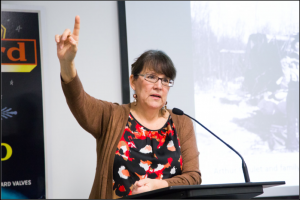
Keynote speaker: Professor Sherry Farrell Racette. Photo: Mark Beatty, Imaging Services, National Library
The symposium kicked off with two keynotes. The first, Professor Sherry Farrell Racette (Manitoba) on “Enclosing some Snapshots”: James P. Brady, Photography and Political Activism, showed how photography was such an integral part of the work of this well-known Métis activist. A self-taught community-based photographer, Brady used it record Metis life at a time when these communities were impoverished and its people lacked rights.
Professor Jane Lydon then gave Aboriginal Transformations of the Photographic Archive on how Aboriginal communities are now using historic photographs. She traced the emotional and healing properties of photographs, and echoing Sherry Farrell Racette’s keynote, pointed to the link between photography, rights and political activism. Drawing upon her Australian Research Council-funded project that identifies and returns Aboriginal photographs held in European collections, Jane noted that while photographs carry the burden of the colonial past, Aboriginal families see them as ways to connect with family and place. To read more about that ARC project have a look at the website: Returning Photographs: Australian Aboriginal Photographs from European Collections
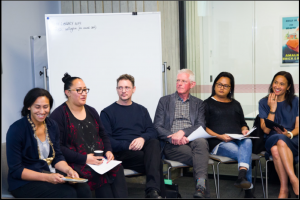
From left: Edith Amituanai, Nina Tonga, Brook Andrew, Paul McNamara, Yuki Kihara, and Jeanette Wikaira. Photo: Mark Beatty, Imaging Services, National Library
After morning tea, a panel of shorter talks ensued, first from three practitioners/artists: Edith Amituanai (Unitec), on the ethics of taking photographs in terms of her own work. Edith spoke about her community-based photography, recording Samoan people and their everyday lives in New Zealand and beyond. She gave us one of the most evocative sentences of the day when she described a photograph as an ‘incomplete utterance of a sentence’; Brook Andrew of Wiradjuri (Monash) discussed the complexities of representation, and his own obsession with the colonial archives, which he uses in his artwork; and Yuki Kihara gave a tour-de-force presentation on the intellectual work underpinning her recent “A Study of a Samoan Savage”, which was inspired by early “scientific” photographs of Samoans in the archive. These were followed by reflections from three people who deal with collections: Paul McNamara on how photographers had utilized the archives in various exhibitions at the McNamara Gallery in Whanganui; Nina Tonga, Te Papa’s Curator Pacific Cultures, on the photography of George Crummer, a trader in the Cook Islands from 1890; and Jeanette Wikaira, Kaituitui Ratonga Māori on how Kai Tahu families interact with the photographic archives of the Hocken Library.
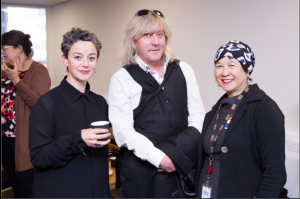
Helen Brown (left) enjoying a break in proceedings with Lyndon Fraser (Canterbury University), and Lynette Shum, Oral History Advisor at the Turnbull. Photo: Mark Beatty, Imaging Services, National Library
The suite of papers reflected on community, place and family. Natalie Robertson of AUT was unable to be at the symposium, but her Siting Mauri through Living Film and Photography using material relating to Ngāti Porou and the Waiapu River was wonderfully and elegantly presented for her by AUT doctoral candidate and photographer Ngahuia Harrison. Helen Brown of Ngai Tahu Archives presented on Wiremu Teira and his Māori Friends where she discussed the Pākehā writer and photographer William A. Taylor and his relationships with Ngāi Tahu communities.
New Zealanders are probably unaware that Aboriginal families, not allowed to live alongside white Australians were relegated to “fringe camps” on the outskirts of outback towns. Karen Hughes (Swinburne University) and renowned Ngarrindjeri weaver Aunty Ellen Trevorrow (Camp Coorong Race Relations Cultural Education Centre) showed life in Ngarrindgeri camps through the intimate and familial portraits made by Aboriginal women photographers.
Chanel Clarke, Māori Curator, Auckland Museum, rounded off the after-lunch session with Dressing the Part: Queen Victoria’s Māori Subjects, on the intersections of dress, photography and colonialism during a visit of Māori to England in the early 1860s. The symposium was lucky to have three “keynote listeners” who all gave their impressions and reflections on the earlier sessions: Damon Salesa (Auckland), Jo Smith (Victoria), and Tina Makereti (novelist, Curator Māori, Museums Wellington). All three touched upon several important themes that united all the presentations: the affective power of photography, the ethics of photography, the rich and varied methodologies being deployed, and the ongoing power of colonial images in the present day.
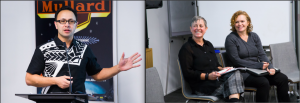
Wonderful “keynote listeners”: Damon Salesa, Jo Smith, and Tina Makereti. Photos: Mark Beatty, Imaging Services, National Library
It was wonderful to be exposed to insights from so many indigenous scholars and practitioners. It was also gratifying to hear how indigenous communities are now using the photographic archives, even those heavily underlain with the violence of colonialism, for their own purposes, as art, for rediscovering histories, and reconnecting communities.
The Canadian Invasion.
It seemed like Dunedin had been invaded by Canadian academics at recent Centre events.
The first event was a half-day symposium, “Colonial Families: New Perspectives” on 20 August, organized by Angela Wanhalla and also funded through her Royal Society Rutherford Fellowship. This featured Laura Ishiguro (University of British Columbia), with ‘“Say nothing”: gossip, intimation, and the limits of intimacy in a colonial family’, a paper that investigated the mixed-race David-Phillipps family, and the gossip and silences around the marriage and children. Jennifer Ashton (Auckland), spoke on ‘Respectability and the Half-caste: The Russells and Manings in 19th Century Hokianga’, on the efforts of early elite Pākehā males for their mixed-race children to gain the cultural capital necessary to become respectable in the emerging settler society. Crystal Fraser (University of Alberta) gave a paper on ‘Reconciling the Future: Past and Present Understandings of Gwich’in Families in the Northwest Territories, Canada’ which looked at her own family’s history living in the “two worlds” of Indigenous and “modern” Canada. Erica Newman (University of Otago) finished this session with the paper ‘The Care of Fiji’s Orphan’s During the Colonial Period, 1874-1970’ looking at guardianship, adoption and orphanages in colonial Fiji, with particular emphasis on Fijian Indian children.
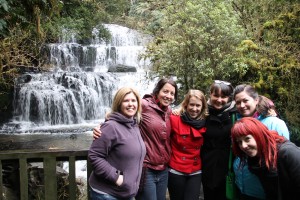
Canadian guests at the Pūrākaunui Falls, in the Catlins, with members of Otago’s History programme, on the weekend. From left: Angela Wanhalla, Jane McCabe, Kate Stevens, Laura Ishiguro, Crystal Fraser and Kristine Alexander.
On 24 and 25 August the two-day symposium, ‘”Unpicking the Tapestry”: Children and Young People in British Colonial Contexts’ was held at the Hocken Collections. CROCC member, Hugh Morrison, gathered a great range of scholars to look at colonial children’s history. This began with a mihi whakatau (welcome) from Mark Brunton, Māori Research Officer (Office of Māori Development, University of Otago).
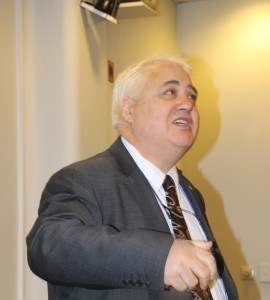
Kei te mihi atu a Mark Brunton (Ngāi Tahu) ki ngā tāngata i tae mai ki te hui rangahau. Mark Brunton (Ngāi Tahu) greeting the symposium attendees.
The first day’s talks were as follows: Crystal Fraser (University of Alberta) ‘”We went through hell together me and my friend; we cried together, we got shit together, and we fought together”: Student Life at Hostels in Northern Canada, 1950s to 1980s’; Chris Brickell (University of Otago) ‘Transport, Modernity and the Making of Adolescent Cultures’;
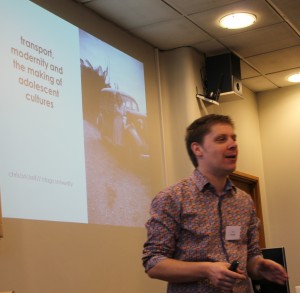
Chris Brickell spoke about how modes of colonial transport operated as cultural spaces for New Zealand adolescents.
Susan Cahill (Concordia University) ‘Where in the Girl’s Realm are the Irish?: Representations of Irish Girlhood in British Girls’ Periodicals 1880-1914′; Michelle Smith (Deakin University) ‘The Family and Maternal Feminism in Colonial Girls’ Literature’; Helen May (University of Otago) ‘Froebel’s “New Child” in the “New World” Colony: Transforming the Kindergarten across Cultures and Continents’; Christina Ergler (University of Otago) ‘Managed Childhoods? Questioning the notion of Urban Children’s Free play in Aotearoa over the Course of History’. Kristine Alexander (Canada Research Chair in Child and Youth Studies, University of Lethbridge) closed off the first day with an evening public lecture, ‘A Tangled Web: Children, Colonialism and Archives’ looking at how the presence of children is marginalized within the Archives.
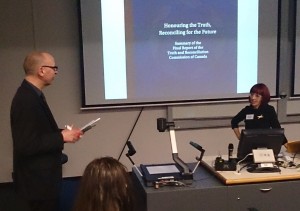
CROCC Director, Tony Ballantyne, who chaired the evening keynote, poses a question to Kristine Alexander.
The second day’s lineup included Lynette Townsend (Te Papa) ‘Child-made Material Culture: an Assemblage of Colonial History’; Jane McCabe (University of Otago) ‘From “Grandmama’s” to “Up the Hill”: Three Childhoods in One Empire Family; Hugh Morrison (University of Otago) ‘Children and Missions: Shifting Identities and Colonial Spaces’; Laura Ishiguro (University of British Columbia) ‘”The future of this country will depend on our children and children’s children”: the Aspirational Politics of Settler Futurity in Colonial British Columbia’; Bettina Bradbury (Victoria University (NZ) and York University) ‘”I don’t think I was ever a boy’: Edward Kearney Junior’s Memoir, Emotion, Memory and Colonial Childhood’;
Anna Gilderdale (University of Auckland) ‘”Sunbeams”, “Cousins” and “Little Folk”: Constructing Young Folks’ Social Worlds through Print, 1880-1920′; Kristine Moruzi (Deakin University) ‘Colonial Children and Charity’. The event closed with a panel discussion headed by Kristine Alexander, Helen May, Kristine Moruzi and Hugh Morrison.
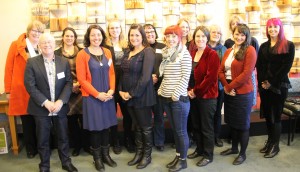
Click to enlarge. Presenters (mostly), from left: Helen May, Hugh Morrison, Christine Ergler, Jane McCabe, Anna Gilderdale, Crystal Fraser, Angela Findlay, Kristine Alexander, Susan Cahill, Kristine Moruzi, Bettina Bradbury, Laura Ishiguro, Lynette Townsend, and Michelle Smith.
Extra Media options: Dunedin TV (the local station) broadcast a two-minute television clip on the “Unpicking the Tapestry” symposium, with short cameos from a few of the presenters. Click here to view.
This was also the first time we have actively used Twitter at a CROCC event, with Angela Wanhalla (and a few others) disseminating regular tweets of snippets of presentations, and the odd photo, as the symposium progressed. These can be accessed on Twitter through #cyccs. Angela has also created a Storify package where the tweets have been collected together, and can be seen without having to have a Twitter account. Click here to access.
Thanks to Hugh and Angela for organizing these two amazing events, and to all the scholars (from Canada, Australia and New Zealand) who made their way to Dunedin to share their research.
Orphanages, Residential Schools, Colonial Gossip
All of these topics will be discussed at a half-day symposium on “Colonial Families: New Perspectives” taking place on Thursday 20th August from 9-12 in Central Library Seminar Room 3, University of Otago. This event is sponsored by the Centre for Research on Colonial Culture, with support from a Royal Society of New Zealand Rutherford Discovery Fellowship and features four speakers who will present new research into the history of the family in Canada, New Zealand and the Pacific:
Laura Ishiguro’s (University of British Columbia) research is trans-imperial and global in scope. She will speak about colonialism, mobility, and intimacy in the “long” nineteenth century through the story of one Metis family from British Columbia. Her talk draws upon her SSHRC-funded research project, “Settler colonialism, global families, and the making of British Columbia, 1849-1871″ (Insight Development Grant 2014-16). She guest-edited a 2013 issue of the Journal of Colonialism and Colonial History on “Imperial Relations: Histories of Family in the British Empire,” and in it called for a rethinking of the meanings of, and relationships between, family, intimacy, and imperialism.
Crystal Fraser (University of Alberta) is a high-profile young Gwich’in scholar who is undertaking research on the impacts of colonialism on her home community, Inuvik, located in northern Canada. She has been identified as “one of the most important Canadian historians of the next generation” whose research on residential schools, gender, and sexuality in Gwich’in society and the Canadian North is “actively shifting both fields as aboriginal people and northerners start writing and directing research in their own history on their own terms”. She is also a leading voice in Indigenous social media, which included hosting @IndigenousXca where she discussed racism in Canadian academia. Crystal will speak about the current debates within Canadian history and society about residential schooling.
Jennifer Ashton (Auckland) will speak about family, race and respectability in northern New Zealand during the nineteenth century. Jennifer’s talk draws from her recently published, and highly regarded first book, At the Margin of Empire: John Webster and Hokianga, 1841-1900 that “takes us into Hokianga to reveal how the evolving intimate relationships and economic transactions of everyday life reflected larger shifts in colonial power” through a biography of the trader and colonist John Webster and his networks.
Erica Newman (Otago) will talk about her original and exciting doctoral research on orphanages and adoption in colonial Fiji. Erica’s research in this area has been recognized internationally in the form of invitations to participate in pre-read workshops at the Berkshire Conference of Women Historians, and an invited publication on her previous work on Māori adoption in the highly regarded American Indian Quarterly.
Contact Dr. Angela Wanhalla (angela.wanhalla@otago.ac.nz) for further information about this free event.
An exciting symposium on colonial childhood
The Centre for Research on Colonial Culture is hosting a free two-day symposium, ‘Unpicking the tapestry: children and young people in British colonial contexts’, comprising 16 different papers on this theme by a range of scholars from New Zealand, Australia, Canada, and the USA, and with roundtable discussions to end each day’s sessions. This will be held in the Seminar Room, Hocken Collections, 24-25 August. Click here for the Draft Programme.
As part of this event, Dr Kristine Alexander of Leithbridge University, a Canada Research Chair in Child and Youth Studies, will be giving a public lecture, “A Tangled Web: Childhood, Colonialism, and Archives”. This will be be held in Burns 2, 24 August at 5.30pm. All interested people are warmly invited.
In particular the symposium is interested in addressing a number of key questions which include: What does it mean to talk about ‘colonial childhoods or adolescence’ or to think about children and young people in relation to colonialism? What colonial sites were significant or influential for children’s and young people’s lives, and in what colonial sites were children influential? To what extent were children and young people constrained by boundaries or moved fluidly across boundaries (eg. gender, race or ethnicity, nation, class, religion), and to what effect? What are the sources for excavating and interpreting colonial childhoods? What are the gaps and silences? How do we negotiate these? In what ways might a comparative approach (across colonial societies) expand or limit our understanding of colonial childhoods and adolescence? What are the significant challenges and opportunities in this field of academic enquiry?
If you are interested in attending the symposium, please contact hugh.morrison@otago.ac.nz by the end of the month.
CFP: Children & Young People in British Colonial Contexts
Dr. Hugh Morrison, with support from the Centre for Research on Colonial Culture, will be hosting a 2-day symposium on 24 & 25 August at the Hocken Collections on the histories and experiences of children and young people. The Call for Papers is below:
******
Unpicking the Tapestry: Children & Young People in British Colonial Contexts
Children and young people were ubiquitous and significant players on the stage of national and colonial formation, yet this remains a significant gap in the history and historiography of British world colonial societies like Aotearoa New Zealand. Therefore an exclusive focus on the historical place of children and young people in comparative colonial contexts is timely in terms of further development; both in the New Zealand context and that of the wider British world. Such discussion can inform a better historical understanding that is locally, nationally, and transnationally configured.
This symposium is sponsored by the Centre for Research on Colonial Culture at the University of Otago, New Zealand. It aims to bring together scholars (from New Zealand and beyond) who are interested in a range of aspects of colonial children and young people under the rubric of ‘unpicking the tapestry’. If colonialism is the overall tapestry holding together children’s and young people’s lives, then what is revealed when we begin picking away at the individual strands of this tapestry? In particular the symposium is interested in addressing a number of key questions which include: What does it mean to talk about ‘colonial childhoods or adolescence’ or to think about children and young people in relation to colonialism? What colonial sites were significant or influential for children’s and young people’s lives, and in what colonial sites were children influential? To what extent were children and young people constrained by boundaries or moved fluidly across boundaries (eg. gender, race or ethnicity, nation, class, religion), and to what effect? What are the sources for excavating and interpreting colonial childhoods? What are the gaps and silences? How do we negotiate these? In what ways might a comparative approach (across colonial societies) expand or limit our understanding of colonial childhoods and adolescence? What are the significant challenges and opportunities in this field of academic enquiry? These are some of the questions we wish to explore further over two days of keynote address, paper presentations and round-table discussions.
The keynote speaker will be Canadian historian Professor Kristine Alexander, who holds the Canada Research Chair in Child and Youth Studies at the University of Lethbridge, Alberta. She will be joined in round-table discussions by education historian Professor Helen May (College of Education, University of Otago) and one further person to be confirmed. Up to a further 16 paper presentations are anticipated in plenary session form (half hour sessions per paper).
Paper proposals should be sent by email to Dr Hugh Morrison (hugh.morrison@otago.ac.nz) in the form of a 300 word (maximum) abstract, accompanied by a paragraph giving academic or professional background by Tuesday 31 March, 2015. Accepted papers will be notified by Friday 24 April at the latest. There will be no registration/symposium costs for presenters, but travel and accommodation costs will need to be individually paid for. It is anticipated that symposium papers will be published as an edited book collection or special journal issue.

